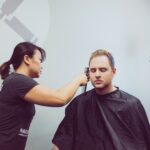Are you ready to embark on a journey of mastering the art of barbering and achieving success in this dynamic industry? Look no further, as this article is your ultimate guide on how to become a barber. Whether you’re a seasoned pro in the grooming industry or just starting out, we have all the insights, tips, and tricks to help you kick-start or elevate your career. Join us as we delve into the exciting world of men’s grooming, revealing the secrets behind creating impeccable hairstyles, mastering cutting techniques, and providing exceptional customer service. Get ready to sharpen your skills, ignite your passion, and unlock your true potential as a barber extraordinaire!

How To Become A Barber
As a seasoned barber with over a decade of experience, I have seen countless aspiring barbers enter the industry, eager to learn the skills and techniques needed to succeed. Becoming a barber is not just about cutting hair; it’s about mastering the art of men’s grooming, creating personalized looks, and providing exceptional customer service. If you’re looking to embark on this rewarding journey, let me guide you through the steps to become a barber and thrive in this field.
Step 1: Research and Educate Yourself
Before diving headfirst into barbering, take the time to research and educate yourself about the profession. Explore the different types of barbering techniques, hair cutting styles, and grooming trends. Familiarize yourself with the tools and products used in the industry and stay updated on the latest advancements. This knowledge will not only give you a solid foundation but also help you understand the expectations and demands of being a professional barber.
“Education is the key that unlocks the door to success in barbering.”
Step 2: Enroll in a Barbering Program or Apprenticeship
To gain the necessary skills and knowledge, it’s crucial to receive proper training through a barbering program or apprenticeship. Look for reputable barber schools or apprenticeship programs in your area. These programs offer comprehensive courses covering everything from basic haircuts to advanced styling techniques. Choose a program that aligns with your goals and learning preferences, whether it’s hands-on training or a more structured classroom environment.
“Learning from experienced barbers is like sharpening your skills on a whetstone.”
Step 3: Practice, Practice, Practice
Becoming a skilled barber requires practice and dedication. Make the most of your time in the barbering program or apprenticeship by practicing on mannequin heads and volunteer models. Experiment with different hair types, textures, and styles to build your versatility and confidence. Don’t be afraid to make mistakes; they are opportunities for growth and improvement. Embrace each haircut as a chance to refine your technique and develop your own unique artistic style.
“The more you practice, the more your skills will sharpen like a well-honed blade.”
Step 4: Obtain a Barber License
In most countries, obtaining a barber license is a legal requirement to practice professionally. Once you have completed your barbering program or apprenticeship, you will need to pass the licensing exam. This exam typically includes a written portion testing your knowledge of barbering theory, as well as a practical demonstration of your haircutting skills. Prepare for the exam diligently, focusing on both the theoretical and practical aspects of barbering.
“A barber license is not just a piece of paper; it’s a symbol of your commitment to professionalism and excellence.”
Step 5: Build Your Professional Network
As a barber, building a strong professional network is essential for success. Attend industry events, trade shows, and barbering conventions to meet fellow barbers, suppliers, and influencers. Engage with other barbers on social media platforms, exchanging ideas and sharing inspiration. Join barbering associations or organizations that offer networking opportunities and educational resources. Cultivating these connections will not only expand your knowledge but also open doors to collaborations and career opportunities.
“Your network is your net worth in the world of barbering.”
Step 6: Stay Updated and Evolve
Barbering is an ever-evolving industry, with trends and techniques constantly changing. To remain at the forefront, it’s crucial to stay updated and continue learning. Attend workshops, seminars, or advanced training courses to hone your skills and learn new cutting-edge techniques. Keep an eye on industry publications, blogs, and social media for the latest grooming trends and product innovations. Embrace the mindset of continuous improvement and adaptability to thrive in this dynamic field.
“The only constant in barbering is change. Adapt and evolve to stay ahead of the curve.”
Becoming a barber is not just about acquiring technical skills; it’s about embodying the artistry, professionalism, and passion that define this craft. By following these steps and embracing the journey with dedication and a commitment to excellence, you can become a successful barber and create a flourishing career in the world of men’s grooming.
So, are you ready to take up the clippers and embark on this exciting adventure?
“Remember, becoming a barber is not just a job; it’s a work of art that you carve with passion and precision.”
Barbering is a skill that has been passed down through generations, evolving into an art form in its own right. If you’re intrigued by the history and techniques behind this age-old profession, then you’ll want to check out these fascinating facts about barbering. From its origins in ancient civilizations to its modern-day significance, this comprehensive guide will take you on a journey through time. Click here to delve into the world of barbering and uncover the secrets that have shaped this timeless craft: facts about barbering. Don’t miss out on this opportunity to enhance your knowledge and appreciation for the art of barbering!
How To Become A Barber
If you have a passion for hair styling and want to turn it into a rewarding career, then you should definitely consider barber training programs. These programs provide comprehensive education on the art of barbering, teaching you everything from classic haircuts to facial grooming techniques. By enrolling in a barber training program, you will gain the skills and knowledge necessary to excel in this industry. Check out our barber training programs here and start your journey towards becoming a professional barber: barber training programs.
In addition to formal training, barbering courses can also play a crucial role in your career development. These courses offer targeted instruction on advanced barbering techniques, helping you refine your skills and stay up-to-date with the latest trends in the industry. Whether you want to specialize in beards or master the art of traditional shaving, barbering courses can provide you with the expertise you need. Explore our wide range of barbering courses here and take your barbering skills to the next level.
If you prefer a more hands-on approach to learning, then barber apprenticeships might be perfect for you. Apprenticeships offer a unique opportunity to learn directly from experienced barbers, gaining practical experience while honing your skills. These apprenticeships often lead to full-time employment opportunities, providing valuable networking connections and a chance to learn from the best. Discover the benefits of barber apprenticeships here and start your journey towards a successful career in barbering.
Remember, becoming a barber requires dedication, continuous learning, and hands-on experience. By taking advantage of barber training programs, barbering courses, and barber apprenticeships, you will not only enhance your skills but also increase your chances of success in this exciting industry. Start your journey towards becoming a professional barber today!
Title: How to Become a Barber: A Comprehensive Guide in 12 Steps
[youtube v=”r58DEzKHKPA”]
Introduction:
Becoming a barber is not just about cutting hair; it’s about turning hair cutting into a profession. In this article, we will explore the 12 steps to becoming a barber, including the reasons why you should consider this career path, the requirements for obtaining a barber’s license, and the options available for barber education. Whether you’re someone who is passionate about hair cutting or looking for a flexible and fulfilling occupation, this guide will provide you with valuable insights.
Section: Reasons to Become a Barber:
1. Passion for Hair Cutting and Barbershop Lifestyle:
Many successful barbers are drawn to the profession because they genuinely enjoy cutting hair and spending time with clients in the barbershop. The flexibility of the job and the ability to create unique styles allow barbers to express their artistic and creative talents.
Flexibility:
Barbering offers a level of flexibility that is attractive to many individuals. Whether you have other commitments or desire control over your own time, being a barber allows you to create a schedule that works for you. This flexibility can be especially beneficial for those who want to be actively involved in their personal lives.Business Ownership:
Becoming a barber grants you the opportunity to be in control of your own business. Unlike traditional nine-to-five jobs, being a barber means you are responsible for your own success. This autonomy allows you to reap the rewards of your efforts and provides a sense of ownership and pride in your work.Consistency:
While barbering may not offer immediate consistency, establishing a solid foundation and consistently delivering quality work will lead to a busy schedule over time. Being dependable and continuously improving your skills will attract loyal clients, ensuring a consistent stream of business.Community Involvement:
As a barber, you have the opportunity to be an active member of your community, interacting with a diverse group of people. Building relationships with clients and being a trusted confidant can create a sense of fulfillment and purpose. Barbers often find themselves connected to various community leaders, allowing for networking opportunities and community engagement.
Section: Reasons Not to Become a Barber:
1. Lack of Artistic and Creative Expression:
While being a great artist is not a prerequisite to becoming a successful barber, having a passion for creativity can greatly enhance your career prospects. The ability to turn your artistic skills and creativity into a profession sets barbers apart from ordinary hairdressers.
Discomfort with Prolonged Standing:
Barbering requires standing for extended periods. If you have health issues or simply dislike standing for extended periods, this aspect of the job may pose a challenge. However, some barbers employ alternative strategies, such as using tall stools, to alleviate physical strain.Unwillingness to Take Control of Business:
Operating a successful barbering business demands a significant level of involvement and responsibility. If you prefer the reliability and simplicity of a nine-to-five job without the added responsibilities of running and marketing a business, barbering may not be the right fit for you.Dislike for Consistency:
Building a successful career as a barber requires consistency in your work ethic and the services you offer. Some individuals may prefer variety and find it challenging to maintain the discipline required to perform the same tasks repetitively over time. A lack of consistency can lead to burnout and hinder professional growth.Discomfort with Interpersonal Connections:
Being a barber involves working closely with people from all walks of life. If you find it difficult to connect with others or prefer limited social interaction, the nature of the profession may not align with your preferences.
Section: Obtaining a Barber’s License:
To become a professional barber, you must obtain a barber’s license. The following steps outline the process:
Education Requirement:
Most states require a GED or high school diploma to enroll in barber school.Barber School:
Barber schools typically require six to twelve months of training, varying depending on the state. Research the specific requirements in your state.Licensing Exam:
After completing barber school, you must schedule and pass a licensing exam. The waiting period for exam appointments can range from one to eight weeks, depending on various factors.Cost of Education:
Barber school costs can vary significantly, ranging from $3,000 to $30,000, depending on factors such as financial aid availability. Financial aid options may be available in certain schools.Apprenticeship Option:
In some states, apprenticeship programs offer an alternative path to obtaining a barber’s license. This route usually takes longer, offers fewer practice opportunities but is more affordable. However, be cautious of unethical practices during apprenticeships.
Conclusion:
Becoming a barber is both a profession and an art form that demands dedication, creativity, and the ability to connect with diverse individuals. By considering the reasons to become a barber and understanding the requirements for obtaining a license, you can make an informed decision about pursuing this rewarding career path. Whether you choose to attend barber school or pursue an apprenticeship, remember that consistency, self-motivation, and a passion for the craft are essential ingredients for success in the barbering industry.
FAQ
Q: What education or training do I need to become a barber?
A: To become a barber, you typically need to complete a barbering program at a vocational school or barber college. These programs usually last around 9 months to 1 year and cover various topics such as haircutting techniques, styling, shaving, beard trimming, and sanitation practices. Some states may also require you to obtain a barber’s license by passing a written and practical exam.
Q: How long does it take to become a certified barber?
A: The time it takes to become a certified barber can vary depending on the requirements of your state and the program you choose. On average, it takes around 9 months to 1 year to complete a barbering program and obtain the necessary licensure. However, this timeline can be longer if you choose to pursue additional certifications or if you are studying part-time.
Q: What skills are important for a barber to have?
A: As a barber, there are several important skills that can contribute to your success. These include excellent barbering techniques, knowledge of different hair types and textures, the ability to communicate effectively with clients, creativity in designing unique hairstyles, good hand-eye coordination, attention to detail, and strong customer service skills. Additionally, staying updated with the latest trends and techniques in the industry is crucial.
Q: How can I gain experience as a barber?
A: Gaining experience as a barber can be done through various avenues. One option is to seek apprenticeships or internships at reputable barbershops or salons. This allows you to learn directly from experienced barbers and gain hands-on training. Another option is to participate in competitions or workshops to further develop your skills and network with other industry professionals. Additionally, building a loyal clientele and consistently practicing your craft can also help you gain valuable experience.
Q: What are some tips for succeeding as a barber?
A: To succeed as a barber, it’s important to continuously develop and refine your skills. This can be achieved by staying updated with the latest trends, attending industry events and workshops, and experimenting with different techniques. Building strong relationships with your clients by providing excellent customer service and creating personalized experiences is also crucial. Additionally, maintaining a professional appearance, investing in high-quality tools and products, and keeping your workspace clean and organized can contribute to your success.
- Unlocking Francis Alexander Shields’ Finance Empire: A Comprehensive Biography - July 12, 2025
- Unveiling Francis Alexander Shields: A Business Legacy - July 12, 2025
- Francis Alexander Shields’ Business Career: A Comprehensive Overview - July 12, 2025















